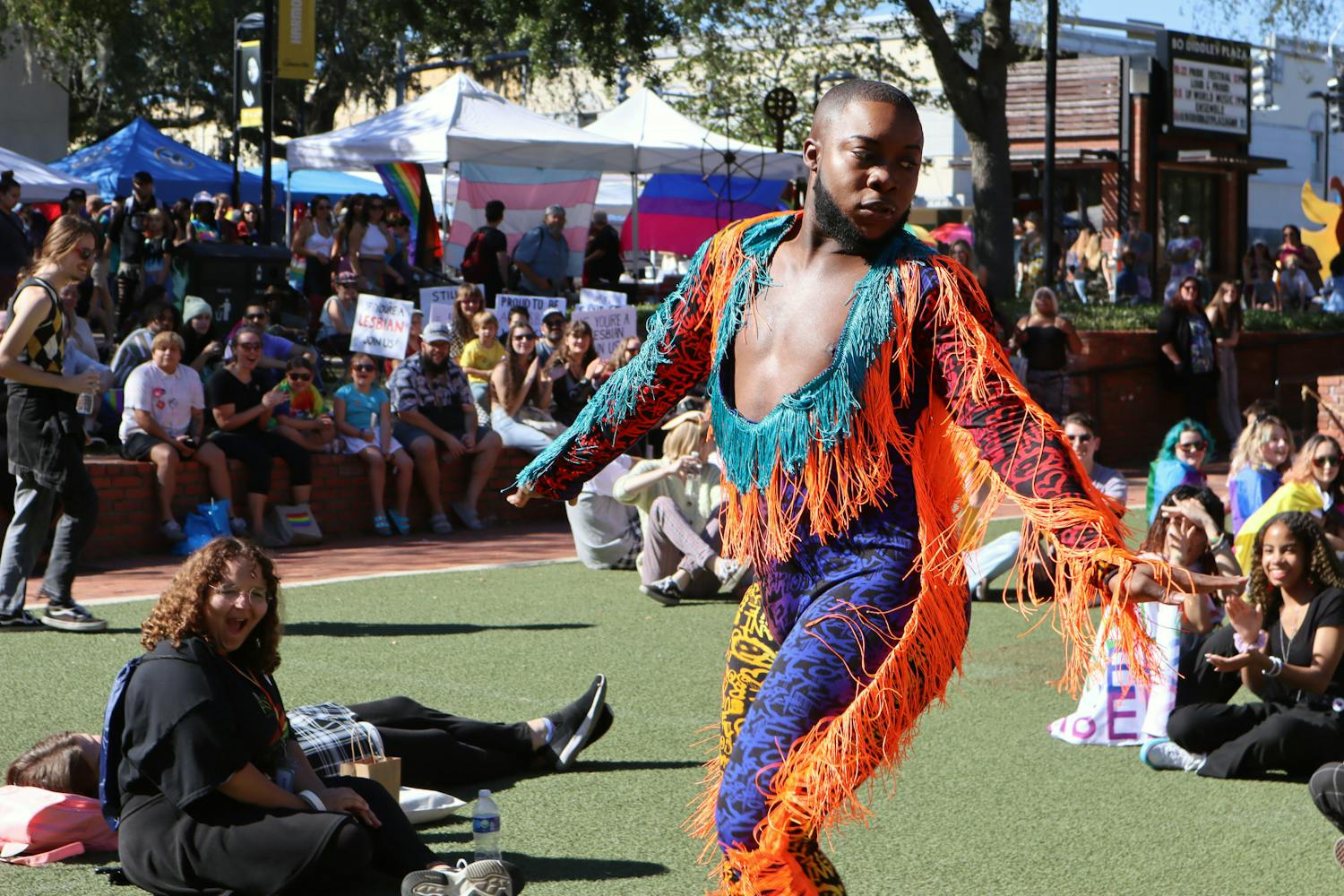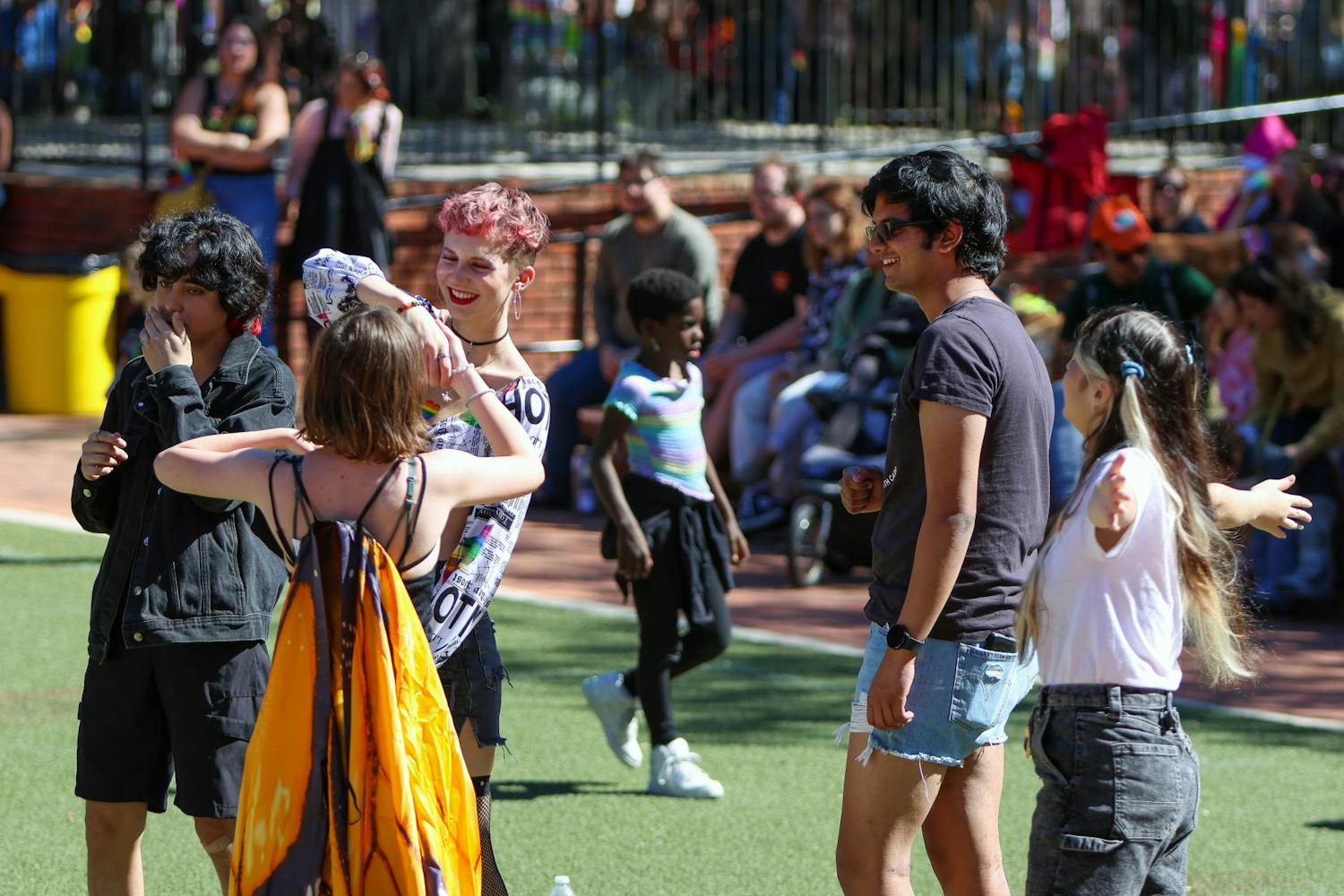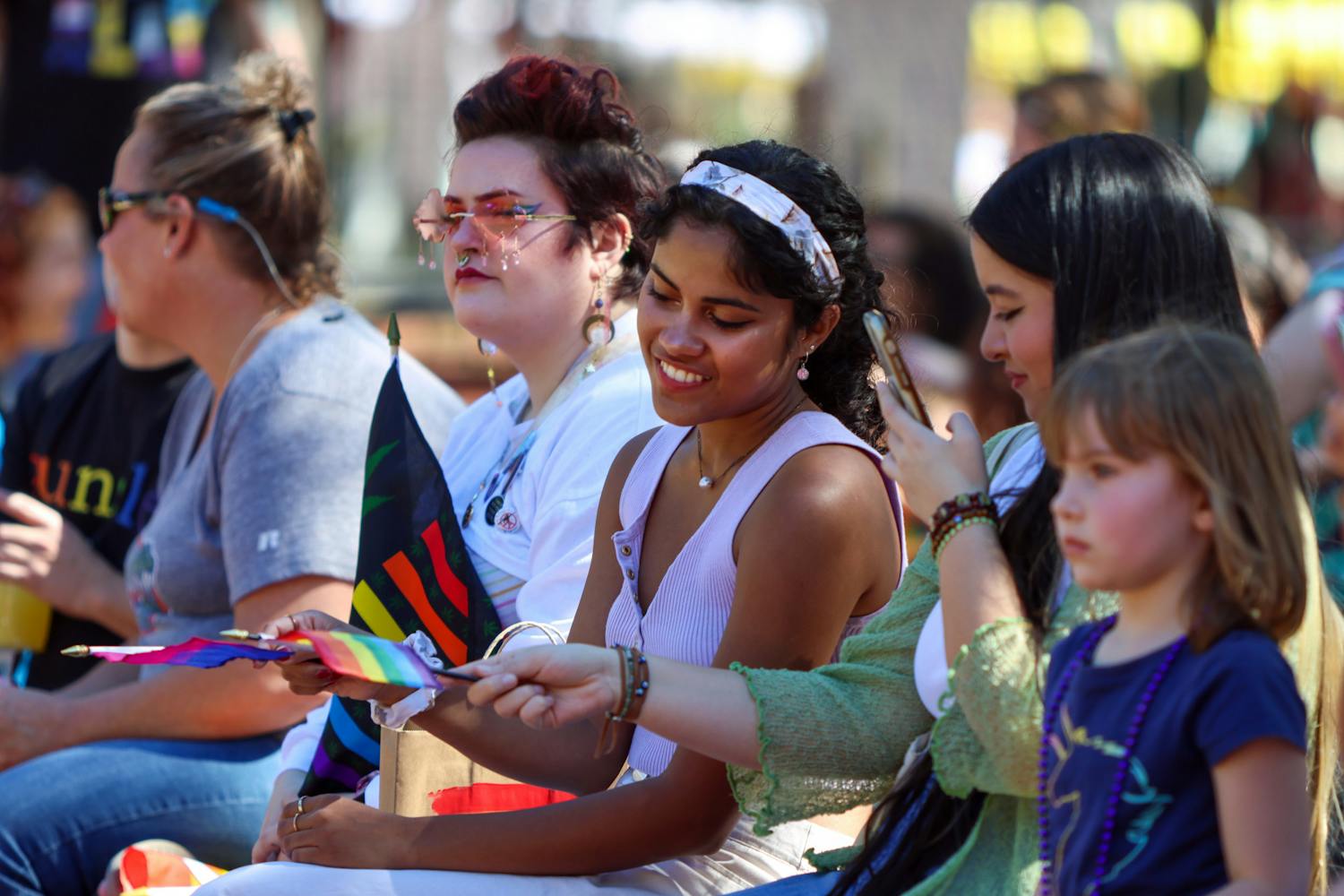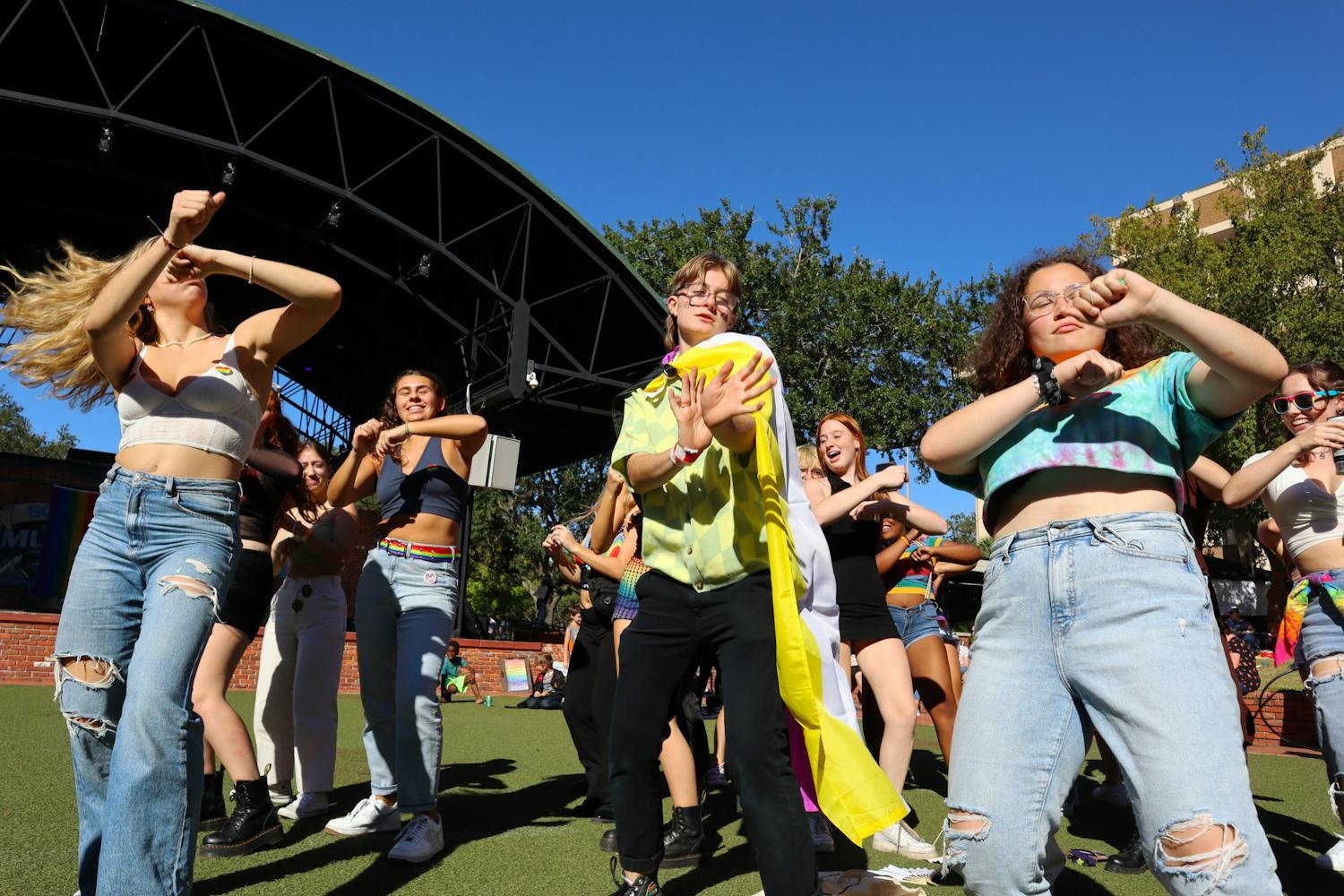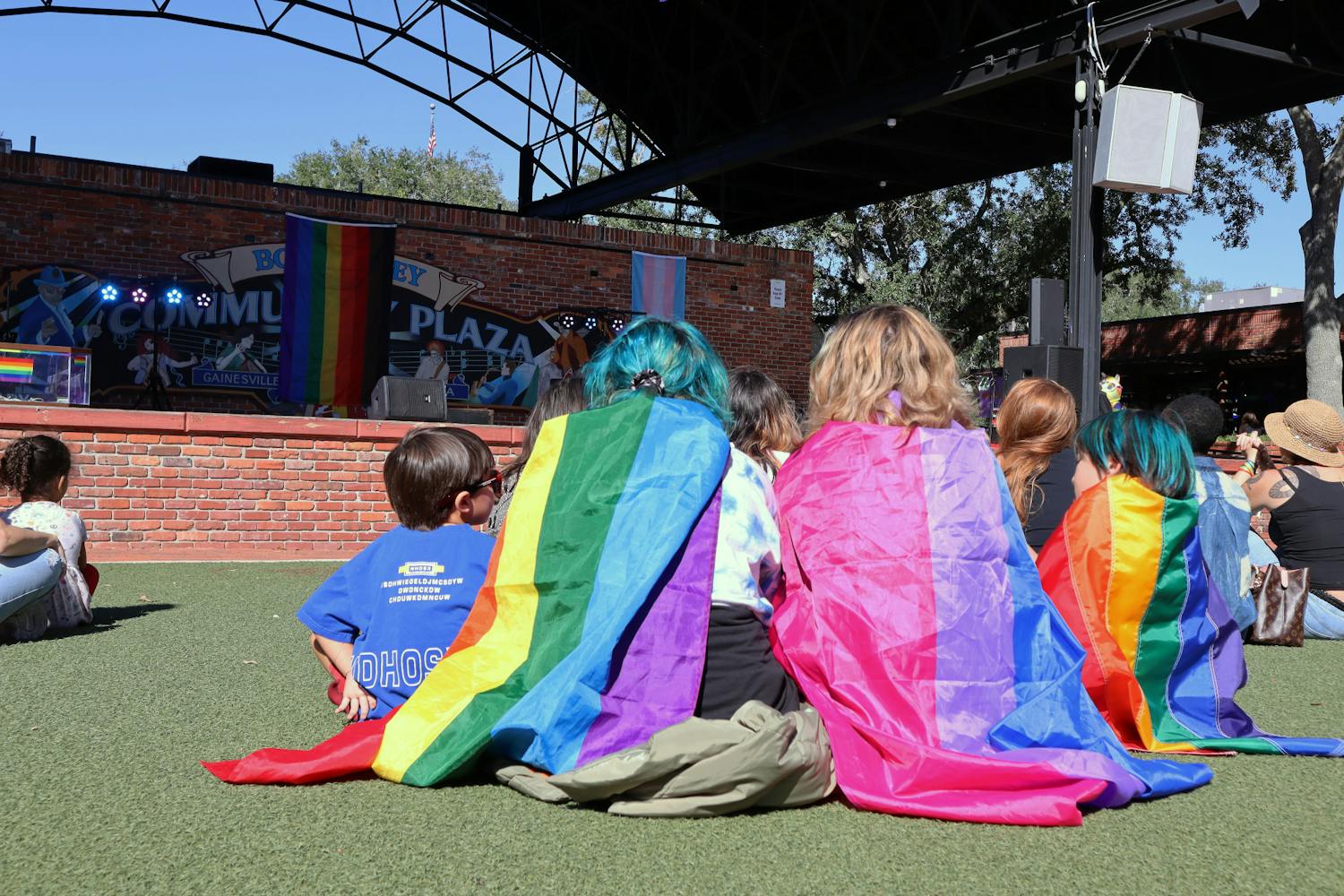The first Gainesville Pride Festival in three years was also the first ever for Manuel Simons and Andrew Brown, his partner of 28 years.
The two new Gainesville residents from New York decided to attend Pride as an introduction to the local LGBTQ community. They’ve been active in the community for years and wanted to continue their tradition of attending events that celebrated visibility and authenticity.
Pride is personal for Simons, a professor in the UF College of the Arts, and Brown, who works in finance. Without places where he feels comfortable being himself, Simons said he doesn’t know where he’d be.
“These events saved my life,” he said.
Thousands of students, parents, children and Gainesville residents gathered in Bo Diddley Plaza Oct. 22 for Gainesville Pride Festival’s grand return. The festival was canceled in 2020 and 2021 because of the COVID-19 pandemic, but attendees came back in full force — adorned in all colors of the rainbow and representing all sectors of the LGBTQ community.
The center estimates about 6,000 attendees filtered in and out of Bo Diddley throughout the day — the largest turnout Gainesville Pride Festival has ever had, Pride Center President Tamára Perry-Lunardo said.
The event followed vandalism of Pride Community Center of North Central Florida Sept. 24, when the front door and window were found smashed alongside a hateful note. Gainesville police are investigating the incident as a hate crime.
But recent events didn’t stop the center from hosting Pride this year. Instead, the festival was an act of resilience meant to show individuals and groups across the state that the LGBTQ community won’t back down, Perry-Lunardo said.
“We’re not going to go away or hide or be quiet just for the convenience or comfort of a few,” she said.
The vandalism did spark security concerns, Perry-Lunardo said. The streets surrounding Bo Diddley were closed down, Gainesville police officers dotted the plaza, and she said members of Veterans for Equality were available to act as a human shield between attendees and instigators in the event of any unrest.
This year also saw a break from tradition in its lack of the Pride Parade due to extra expenses and safety measures, Perry-Lunardo said.
As local drag performers, members of the Gainesville Circus Center, DJs and bands entertained the crowd on the plaza, activists and interest groups like the Alachua County Labor Coalition, Moms Demand Action and National Women’s Liberation lined the walkways around Bo Diddley in tents, distributing pamphlets and chatting with walkers.
Alex Johnson and Marisa Luciano, two representatives from Planned Parenthood, talked with attendees about reproductive health and Planned Parenthood services. Johnson, a 19-year-old UF women’s studies sophomore, said she felt it was important for the organization to make connections with the LGBTQ community.
“We need more emphasis on bodily autonomy, especially within the queer community,” she said.
Though Planned Parenthood is typically associated with women, Luciano, a 23-year-old UF marriage and family therapy graduate student, said reproductive health is important for everyone. Attending Pride, she said, helps Planned Parenthood bridge the gaps between different demographics.
“Reproductive rights affect everybody across all communities,” Luciano said. “We never want people to be left out.”
Along with activists, religious organizations like the United Methodist Church and Temple Shir-Shalom were in attendance at the festival. These organizations were at the intersection of religion and LGBTQ rights, promoting an inclusive experience that still placed faith at the forefront.
Tamara Millay, the 55-year old treasurer of Trinity Metropolitan Community Church of
Gainesville, said her church was founded as a safe space for people of all identities and orientations. In a religious landscape that often discriminates against LGBTQ people, Millay said Trinity is open to everyone.
“What God says is, ‘Love your neighbor and love God,’” she said. “God made us all and loves us all.”
Vendors like Zera Lefkowitz, 39, supported the LGBTQ community through their businesses. Lefkowitz, a UF graduate and former optometrist, opened her independent bookshop, Compass Collective, in April where she sells and promotes books that highlight historically marginalized authors and characters.
“As a woman of color, representation is so important,” Lefkowtiz said. “And to see yourselves in stories is a key component in cultivating a sense of acceptance, empathy [and] belonging.”
Community leaders also engaged with Pride. Supporters of James Ingle, a District 2 City Commission candidate, set up a tent, and Bryan Eastman, the District 4 commissioner elect, talked with attendees in support of Democratic mayoral candidate Harvey Ward.
Eastman attended Pride to express his support for the LGBTQ community and celebrate Gainesville’s diversity, he said. Gainesville’s inclusivity is its strength, he said, and he’s proud of the beacon of acceptance the city has become.
One of Eastman’s first introductions to activism came at 12 years old, when his younger sister came out. That experience, he said, solidified his commitment to inclusivity.
“I saw how much LGBTQ people can be left out of the conversation,” Eastman said. “It’s really important to make sure everyone feels welcome.”
Gainesville Pride is one way both old and new city residents go about finding their support system.
Kim Gallet, 36, moved from South Florida to Gainesville 11 years ago. Accompanied by her chihuahuas Mo and Stanley, she said events like Pride are one of the reasons she’s found the city to be a progressive, welcoming environment.
Still, Gallet recognizes such inclusivity is often at odds with legislation being implemented across the state, she said. The Parental Rights in Education Act, dubbed the “Don’t Say Gay” bill by critics, has limited the ability of teachers like Gallet to speak about topics of sexual orientation and gender identity since it was signed into law by Gov. Ron DeSantis in March.
As an elementary school teacher who identifies as a lesbian, Gallet said she hopes she’s a role model for students who are exploring their own identities.
“I definitely try to be very open in my classroom,” she said. “I feel like the governor has closeted me in a way, but I definitely feel like I can still be myself and let everyone know they’re always welcome to come talk with me.”
Not all attendees personally identify within the community. Some, like 35-year-old lifelong Gainesville resident James Shaw, came in support of family members. His wife, Jessica, identifies as bisexual, and his 9-year-old daughter, Emma, likes boys and girls.
It’s important to bring younger kids out to events like the Pride Festival that promote love and acceptance for all individuals regardless of sexuality, Shaw said.
Annabel Crater, an 18-year-old UF mechanical engineering freshman, said they were astonished by the overwhelming presence of children and families throughout Bo Diddley. While it wasn’t their first festival — they attended Cape Coral Pride in 10th grade — Gainesville Pride brought a lot of firsts, they said.
For one, it was their first Pride since moving away from Sanibel, Florida, and starting college — a transition Crater said made them more comfortable identifying as nonbinary and using gender-neutral pronouns. Gainesville Pride also connected Crater with their first full-size nonbinary pride flag, which they wore draped over their shoulders.
Crater also sported a more subtle symbol of celebration: a pair of sneakers with the Pride flag colors printed onto the soles. Being surrounded by visibly queer members of the community, they said, made them more confident expressing their own identity in public.
“I got [these shoes] ages ago, but they sat in my closet for forever,” Crater said. “I didn’t wear them for a long time because I was scared to.”
Meeting young members of the LGBTQ community who are comfortable with their gender, they said, was the most endearing part of the experience.
“There was a little 11-year-old nonbinary person who asked me about where I got my flag, and I befriended them,” Crater said. “And I’m like, ‘You’re 11! That’s so cool.’”
Contact Veronica and Heather at vnocera@alligator.org and hbushman@alligator.org. Follow them on Twitter @vernocera and @hmb_1013.

Heather Bushman is a fourth-year journalism and political science student and the enterprise elections reporter. She previously wrote and edited for the Avenue desk and reported for WUFT News. You can usually find her writing, listening to music or writing about listening to music. Ask her about synesthesia or her album tier list sometime.
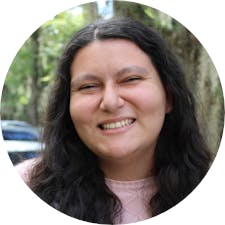
Veronica Nocera is a third-year journalism major, history minor and The Avenue editor. She spent two semesters reporting arts and culture for The Alligator and also writes for Rowdy Magazine. When she’s not writing, she’s probably reading, journaling or taping random pictures to her wall. Also, she’ll probably be wearing yellow.


